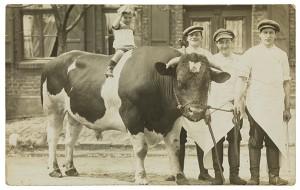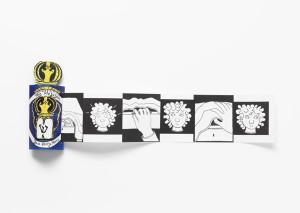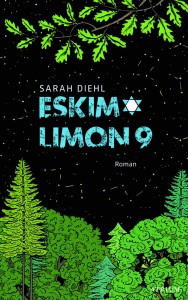
Walter Brill on a bull in the town of Herzebrock, ca. 1913
© Jewish Museum Berlin, courtesy of Brill Family Archives
I first met Ralph Brill at the Jewish Museum Berlin in 2009. He was accompanying a donor, and it was only incidentally that I learned of his own interesting family history. Some months later he sent me copies of family photographs and documents, and I immediately realized that this impressive material was of historical importance. We were in frequent contact since then. In early 2013 Ralph Brill decided to donate all of his family holdings to the Jewish Museum Berlin. It was a most memorable day in May, when he visited Berlin with his children, Micah, Loren and Wade. The three young Brills had just obtained German citizenship, in addition to their American nationality. Present legislation assures this option to all, whose lives were affected by National Socialist persecution, as well as their descendants. The trip to Berlin was motivated by Micah, Loren and Wade’s interest in learning about their ancestors. It was the first time any of the three had set foot on German soil. → continue reading
Since the end of August visitors to the permanent exhibition have been able to purchase small artworks from an ‘art vending machine.’ The artworks have been created by Jewish artists living and working in Berlin.

Paper mezuzah with pull-out comic strip by Zara Verity Morris
© Jewish Museum Berlin, photo: Jens Ziehe
Today we present one of the artists: Zara Verity Morris from London. Morris is currently studying for her Masters degree at the “Institute for Art in Context,” at the Berlin University of the Arts. For the art vending machine she has created a comic strip called “The Mezuzah” on a pull-out paper scroll. (A mezuzah is a small case, which is attached to the door posts of Jewish households. Inside is a handwritten parchment scroll with the Hebrew prayer “Shema Yisrael” (“Hear O Israel”).
Christiane Bauer: Zara, can you for starters briefly explain to me why you produced this particular object for the art vending machine?
Zara Verity Morris: I found it an interesting challenge to play with the limited space of the art vending machine, and wanted to make something that could be unfolded once it has been taken out. The long paper roll was inspired by the formal connection between the Torah and a mezuzah.
When I was a young child, I found a few mezuzot in a drawer in varying conditions. A few had open cases. I was surprised to discover a paper scroll lying inside one of them with Hebrew writing on it. I was excited, and thought it was like a toy Torah. As a child, one of my favourite parts of being at a service at synagogue was the heavy Torah being ‘undressed’ by two people; getting its velvet cover and decorations taken off to reveal the plain paper scroll underneath. I decided to turn these childhood memories into a comic.
How does “The Mezuzah” fit into your previous work? → continue reading
When German friends of mine choose to move from Darmstadt, in Hesse, into the surrounding countryside, I shake my head in disbelief. That an Israeli family would leave Tel Aviv not, as many Israelis do, to move to Berlin (see the German-language blog post offering ten tips for Israelis in Berlin), but rather to the tiny Hessian town of Niederbrechen, seems audacious, if not outright absurd. This scenario, however, is the starting point of Sarah Diehl’s debut novel Eskimo Limon 9. The novel depicts a “very particular kind of culture clash,” as the book’s flap announces.

Book cover
© Atrium publishers
Some of the characters are Israelis, and they have little interest in discussing Germany’s past or the history of European Jews.
“The only thing in the Jewish Museum that will remind me of home will probably be the metal detector you have to go through at the entrance.”
The novel’s Israeli father Chen wishes Germans “would associate us with Eskimo Limon instead of six million dead.” The title of the book refers to a film series of the same name, which aired in Germany in the 1980s as Eis am Stil (Popsicle), “one of the few Israeli pop culture phenomena […] familiar to German audiences.” Many assume that the series is Italian, which—as the author of the novel argues—shows how selective Germans’ perception of Israel can be, and how limited their idea of Jewishness often is.
Other characters are natives of Niederbrechen. → continue reading


